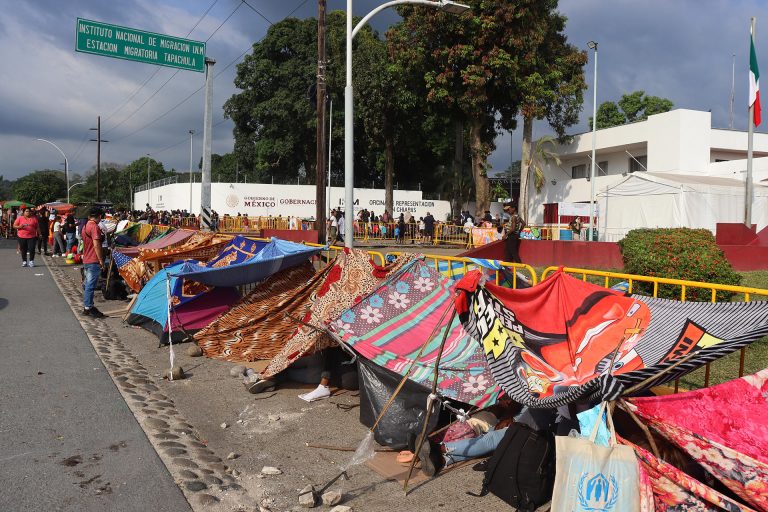4 de enero 2023

“NicaraguAmor” Cultural Caravan for Nicaraguans in the USA

PUBLICIDAD 1M
PUBLICIDAD 4D
PUBLICIDAD 5D
Such family camps hadn’t been seen since 2019, when hundreds of African migrants arrived in the southern Mexico city of Tapachula

Migrants improvised a camp outside the National Migration Institute, in Tapachula, Mexico. Photo: EFE/ Juan Manuel Blanco
Some 2,000 migrants have set up a makeshift camp in the Mexican city of Tapachula, Chiapas, just across the border from Guatemala. They began camping there on January 3rd while awaiting their transit permits to legally cross Mexico.
Migrant families from Nicaragua and other countries established the camp outside Mexico’s XXI Century Immigration Post, the site designated by Mexico’s National Migration Institute for the temporary shelter of migrants unable to demonstrate legal immigration status.
Several groups, each consisting of some 100 migrants from different countries, have been turning themselves in periodically to the Mexican immigration authorities, in order to begin the process of asylum, as well as arrange their legal stay in the country.
Such large family camps outside the immigration office hadn’t been seen since 2019, when hundreds of African migrants arrived in Tapachula.
This camp is made up of migrants from Nicaragua, Honduras, El Salvador, Haiti, and some African countries. They’ve constructed makeshift “tents” using blankets, sheets and cardboard, tied to the metal fences. These serve to shelter them from the sun during the day, and from the gusts of wind during the night.
Nicaraguan Elison Huerta told EFE that they made the decision to remain at that spot because more people are arriving every day and filling the slots for official attention.
“We’re a family of five children and three adults, and we’ve been waiting here for five days, because there are a number of lists circulating. The Mexican immigration authorities call groups all day long, and you have to wait your turn,” he clarified.
According to this Central American migrant, they’re just awaiting their 30-day transit permits, in order to later submit their Multiple Migration Forms and be allowed to remain legally in the country for a time.
Ronald Lopez, another Nicaraguan migrant, said he’s watched the Tapachula authorities attend to thousands of people. It’s a lengthy process, and the foreigners shouldn’t become desperate and jump on buses at the first chance they get. All their documents must be registered with the Mexican government first.
“At the moment of boarding a bus, when the Mexican Immigration agents are present, these documents must be handed to them. If I appear in their system, I’m good; but if they just handed the papers to me that day and I take off, I’m not going to appear in their system, and at the first checkpoint, they’ll destroy them,” Lopez explained.
He stated that he arrived at this place on Tuesday, around 9 am, local time, and they told him he’d be seen in the afternoon, since the authorities are receiving some 100 people at a time. He trusted his case would be attended.
Earlier on Tuesday, thousands of migrants protested and forcefully entered the offices of the Mexican Commission for Aid to Refugees (Comar) on Mexico’s southern border, because the asylum application process had temporarily halted.
The foreigners, the majority from Haiti, South and Central America and Africa, had been camped for nearly 48 hours in front of the Comar offices in Tapachula, which borders with Guatemala. Frustrated, the migrants jumped the metallic fences and forcefully entered the building.
Both of these events are reflections of the record migratory flow towards the United States, where the Office of Customs and Border Protection arrested the unprecedented number of over 2.76 million undocumented migrants in fiscal year 2022.
Nicaraguans, Cubans, and Venezuelans lead the record numbers of migrants trying to reach the United States in 2022. Between January and October of this year, 147,277 Nicaraguans were detained by the US Border Patrols, hugely surpassing the numbers from 2021, when 87,749 Nicaraguans surrendered to the authorities.
In Mexico, the Comar received more than 118,000 asylum requests in the first months of 2022, the second consecutive year of record-breaking request numbers since such data began being compiled.
This article was originally published in Spanish in Confidencial and translated by Havana Times
PUBLICIDAD 3M
Agencia de noticias internacional con sede en Madrid, España. Fundada en Burgos durante la guerra civil española en enero de 1939.
PUBLICIDAD 3D